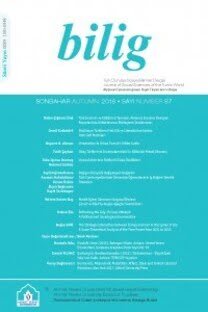July 15: The Siege of Democracy in Turkey and the People's Unprecedented Resistance
15 Temmuz: Kuşatılan Türk Demokrasisi ve Halkın Emsalsiz Direnişi
___
- Aktar, Cengiz (2015). "Resources and Shortcomings of Pluralism in Today's Turkey: Gezi Park Protests in the Light of Pluralism". Philosophy and Social Criticism 41(4-5): 465-471.
- Akyol, Mustafa (2016). "Turkey is in its own post-9/11 fury". Al Monitor. August 25. Available at: http://www.al-monitor.com/pulse/ originals/2016/08/turkey-coup-attempt-risk-of-overreaction.html [Accessed: 26.08.2016].
- Aras, Bülent (1998). "Turkish Islam's Moderate Face". Middle East Quarterly 5(3): 23-29.
- Aydın, Ertan (2014). "Turkey's Failed Bureaucratic Coup". Project Syndicate, January 10. Available at: https://www.project-syndicate. org/commentary/ertan-aydin-traces-the-recent-corruption-scandals- roiling-turkish-politics-to-the-religious-hizmet-movement-s- colonization-of-the-judiciary?barrier=true [Accessed: 21.05.2016].
- Aydın, Suavi and Yüksel Taşkın (2014). 1960'tan Günümüze Türkiye Tarihi. İstanbul: İletişim Yay.
- Carroll, Jill (2007). A Dialogue of Civilizations: Gülen's Islamic Ideals and Humanistic Discourse. New Jersey: Tughra Books.
- Daily Sabah (2016). "Failed coup attempt in Turkey was like 9/11, MP says". August 5. Available at: http://www.dailysabah.com/war-on- terror/2016/08/05/failed-coup-attempt-in-turkey-was-like-911-mp- says [Accessed: 05.08.2016].
- Daily Sabah Centre for Policy Studies (2016). "July 15: Gülenist Coup Attempt". Report. Issue 3. Available at: http://www.dailysabahcentre. com/store/file/common/a8f4497bbbc2716ee5c9225d0bb67dce.pdf [Accessed: 05.08.2016].
- Değirmenci, Ali (2016). "Cemil Koçak ile Söyleşi: 'ABD'nin Onayı Olmadan Darbe Yapılamaz'". Okur Yazar: Kitap Kültürü Dergisi 13(25): 12-15. Available at: http://www.timas.com.tr/pdf/okuryazar15temmuzozel. aspx [Accessed: 24.08.2016].
- Esen, Berk and Şebnem Gümüşçü (2016). "Rising Competitive Authoritarianism in Turkey". Third World Quarterly 37(9): 1581-1606.
- Esposito, John L. and İhsan Yılmaz (2010). "Transnational Muslim Faith- Based Peacebuilding: Initiatives of the Gülen Movement". European Journal of Economic and Political Studies 3: 87-102.
- Göle, Nilüfer (2013). "Gezi - Anatomy of a Public Square Movement". Insight Turkey 15(3): 7-14.
- Kadıoğlu, Ayşe (2016). "Coup d'Etat Attempt: Turkey's Reichstag Fire?". Open Democracy. July 16. Available at: https://www.opendemocracy. net/ay-e-kad-o-lu/coup-d-tat-attempt-turkey-s-reichstag-fire [Accessed: 17.07.2016].
- Kalaycıoğlu, Ersin (2015). "Turkish Popular Presidential Elections: Deepening Legitimacy Issues and Looming Regime Change". South European Society and Politics 20(2): 157-179.
- Öniş, Ziya (2015). "Monopolising the Centre: The AKP and the Uncertain Path of Turkish Democracy". The International Spectator: Italian Journal of International Affairs 50(2): 22-41.
- Özbudun, Ergun (2014a). "Competitive Authoritarianism". Turkish Review 4(6).
- _______ (2014b). "AKP at the Crossroads: Erdoğan's Majoritarian Drift". South European Society and Politics 19(2): 155-167.
- Özdalga, Elisabeth (2000). "Worldly Ascetism in Islamic Casting: Fethullah Gülen's Inspired Piety and Activism". Critique 17: 83-104.
- _______ (2003). "Secularizing Trends in Fethullah Gülen's Movement: Impasse or Opportunity for Further Renewal?" Critique: Critical Middle Eastern Studies 12(1): 61-73.
- Yavuz, Hakan (1999). "Towards an Islamic Liberalism? The Nurcu Movement and Fethullah Gülen". Middle East Journal 53(4): 584- 605.
- Temmuz: Kuşatılan Türk Demokrasisi
- ve Halkın Emsalsiz Direnişi
- Zeyneb Çağlıyan İçener*
- ISSN: 1301-0549
- Yayın Aralığı: 4
- Başlangıç: 1996
- Yayıncı: Ahmet Yesevi Üniversitesi Mütevelli Heyet Başkanlığı
Turkey - EU Relations after the Failed July 15 Coup Attempt
July 15: The Siege of Democracy in Turkey and the People's Unprecedented Resistance
The Rethinking of the 15th July Coup Attempt on Bureaucratic Communitarianism in Turkey
Why Did People Become Human Shields Against The Coup?
The July 15 Failed Coup Attempt and Its Implications for Turkish Foreign Policy
Giray Saynur DERMAN, Hande OBA
On Turkey's Classical Revolution of July 15
Turkish Professional Military Education and Civilian Control
